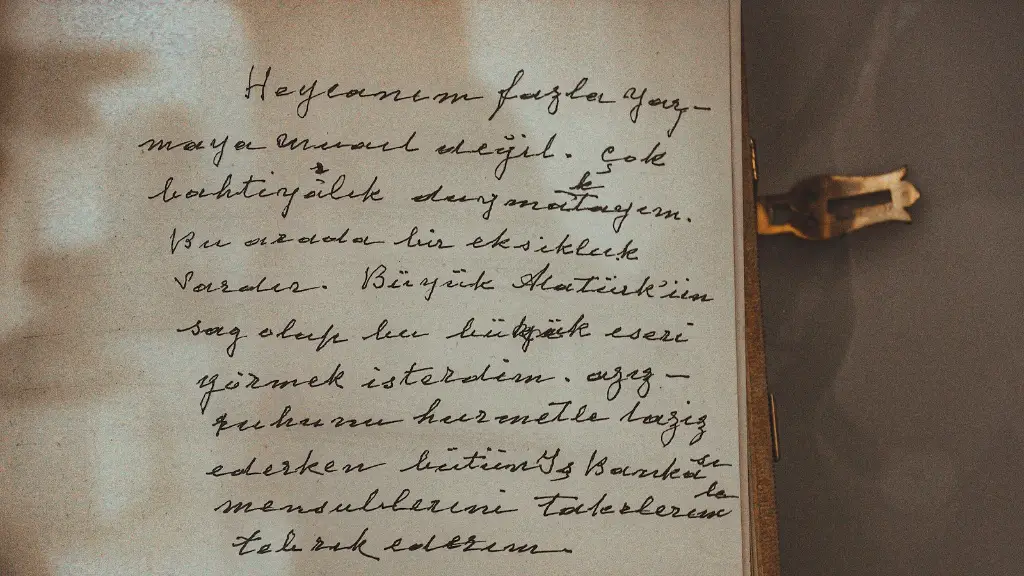Anaphora is an artistic and meaningful use of repeated phrases or words at the beginning of successive clauses or sentences in poetry. Anaphora adds emphasis to the point being made in the poem and helps to drive the poem’s message home.
At its core, anaphora is a rhetorical device that draws attention to something particular in a passage by emphasizing it. The most noticeable characteristic of anaphora is that it is used to repeat the same word or phrase as the beginning of successive lines or clauses. This repetition leads to a kind of musical effect and a strong emphasis on the word or phrase being repeated. Anaphora can be used to create a mood of mystery, suspense, and drama.
Anaphora helps to give a sense of rhythm and builds momentum, focusing the reader on the importance of the author’s language. Through the use of repetition, anaphora can give great life to a poem. It can also help to create vivid imagery and energize the poem.
Anaphora is typically used to draw attention to certain words or phrases, usually in a poem to emphasize its message. It can also be used to show the passage of time, mark important ideas or concepts, and create a more vivid description of what is being communicated.
Anaphora can be used to add powerful emphasis to a poem, to create a dramatic atmosphere, or to simply paint a vivid mental image. The repetition of a word or phrase connects the reader and poet, and serves as a bridge between the two, allowing the poem to be interpreted on a deeper level.
The use of anaphora in poetry is not as simple as occasionally starting sentences or verses with the same word or phrase. The use of anaphora should be intentional and meaningful, as the repeated words and phrases should be chosen carefully to accurately convey the desired message and emotion.
How to Use Anaphora
Using anaphora in poetry requires a nuanced understanding of the writer’s purpose and the use of precise, powerful language. To effectively use anaphora, writers should determine the purpose of the poem, the tone and feeling they want to convey, and the precise words to use in order to accomplish these goals.
Writers should also be mindful of the length of the anaphora. An excessive anaphora can sound repetitious and dull, making the poem sound flat and pedantic. A short anaphora, however, is more effective, as it can create a clear, focused imagery and evoke more powerful emotions in the reader.
Anaphora should also be used judiciously. Too much anaphora can distract from the poem’s meaning, making it seem cloying and unoriginal. The best use of anaphora is when the repetition of words or phrases has a clear purpose, and the use of anaphora itself will not distract from the poem’s message.
Examples of Anaphora in Poetry
Examples of anaphora in poetry can be found in many famous works of literature. One example is in Alfred Lord Tennyson’s famous line, “The splendor falls on castle walls/And snowy summits old in story”. Here, the anaphora in “castle walls” and “snowy summits” creates an image of grandeur and beauty.
Another example of anaphora in poetry is Walt Whitman’s “O me! O life!/ Of the questions of these recurring.” Here, the anaphora in “O me” and “O life” emphasizes the poet’s sense of confusion and hardship.
Finally, an example of anaphora in poetry can be found in Robert Frost’s “Stopping by Woods on a Snowy Evening”. The phrase “the woods are lovely, dark and deep” is anaphora, and the repetition of the phrase draws the reader into the imagery of the woods, emphasizing their beauty and mystery.
The Role of Anaphora in Poetry
Anaphora has been a part of poetry from the very beginning, and has been used as a powerful tool to create visual and emotional imagery. We may use anaphora to draw attention to a specific theme and to create a mood or to emphasize particular words or passages.
Anaphora can be seen as a kind of punctuation, allowing us to set the reader up and control the pacing and flow of the poem. By using anaphora, we can draw attention to specific words and phrases, allowing us to craft a powerful poem that speaks directly to our audience.
The Benefits of Anaphora
The use of anaphora in poetry has many benefits, including helping to create vivid imagery, conveying emotion and feeling, and emphasizing themes. Anaphora can also help draw the reader in, creating a sense of connection and understanding between the poet and the reader.
Anaphora is a powerful tool for poets because it allows the poet to emphasize words and phrases, creating a mood and building symmetry and rhythm in their poem.
Finally, anaphora can be used to help create a sense of mystery and suspense. By repeating words or phrases in a poetic line, the poet can draw the reader in and create a sense of expectation and anticipation.
Conclusion
Anaphora is a tremendously important tool for poets. It allows us to emphasize words and phrases, build emotion and feeling, and create vivid imagery and suspense. By using anaphora judiciously and thoughtfully, we can craft powerful and effective poems that speak powerfully to our readers.




